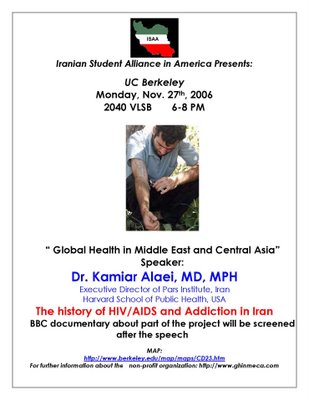
The history of HIV/AIDS and Addiction in Iran
What: The Global Health in MECA, formerly the Pars Curative Research Institute, is a nonprofit membership organization that was created in 2000 to identify priority HIV/AIDS problems in Iran .
Despite its strong attachment to religious values, Iran has shown remarkable openness to addressing HIV/AIDS and its relationship with drug use.
As a result of their efforts, much of the stigma associated with drug use and HIV/AIDS is being pushed aside. The program shows the successes and challenges of HIV/AIDS in Iran and the implications for the region.
BBC documentary about part of the project will be screened after the speech.
For further information please visit http://www.ghinmeca.com/
Who: Dr. Kamiar Alaei, MD, MPH
Executive Director of Pars Institute, Iran
Harvard School of Public Health, USA
Dr. Arash Alaei and Dr. Kamiar Alaei had a critical contribution to establish the first counseling and care center for HIV infected cases, Sexually Transmitted Infected cases and injecting drug users in Iran, documented by WHO as A "Best Practice model" in WHO/EMRO. They were co-authors of Iran’s National and International Strategic Plans for the Control of HIV/IDU/TB and key players in putting Iran’s Proposal to the Global Fund to Fight AIDS/TB/Malaria.
When: Monday, Nov. 27th, 2006 6 - 8 p.m.
Where: 2040 VLSB (Map)
Cost : FREE
* This event is open to the public
To View the official flyer click here
What: The Global Health in MECA, formerly the Pars Curative Research Institute, is a nonprofit membership organization that was created in 2000 to identify priority HIV/AIDS problems in Iran .
Despite its strong attachment to religious values, Iran has shown remarkable openness to addressing HIV/AIDS and its relationship with drug use.
As a result of their efforts, much of the stigma associated with drug use and HIV/AIDS is being pushed aside. The program shows the successes and challenges of HIV/AIDS in Iran and the implications for the region.
BBC documentary about part of the project will be screened after the speech.
For further information please visit http://www.ghinmeca.com/
Who: Dr. Kamiar Alaei, MD, MPH
Executive Director of Pars Institute, Iran
Harvard School of Public Health, USA
Dr. Arash Alaei and Dr. Kamiar Alaei had a critical contribution to establish the first counseling and care center for HIV infected cases, Sexually Transmitted Infected cases and injecting drug users in Iran, documented by WHO as A "Best Practice model" in WHO/EMRO. They were co-authors of Iran’s National and International Strategic Plans for the Control of HIV/IDU/TB and key players in putting Iran’s Proposal to the Global Fund to Fight AIDS/TB/Malaria.
When: Monday, Nov. 27th, 2006 6 - 8 p.m.
Where: 2040 VLSB (Map)
Cost : FREE
* This event is open to the public
To View the official flyer click here
---------------------------------------------------------------------------------------------
MBA Admissions and GMAT strategy Seminar
What : During this exciting event a Kaplan expert will explore the different admissions steps that students will need to complete to ensure their successful admission into the MBA program of their choice. Some of the topics discussed will be: Personal Statements, Letters of Recommendation, Work Experience, GPA, GMAT, and Applications.
How to develop a realistic timeline will also be discussed so even if you are a Sophomore or Junior you
would really benefit from this event!
When: Tuesday , Nov 28th, 7-8:00 p.m.
Where: 20 Barrows (Map)
Cost : FREE
Cosponsored by : Iranian Student Alliance in America (ISAA) Kaplan Test Prep.
* This event is open to the public
* Seating is Limited so be sure to RSVP by sending an email to isaa.berkeley@gmail.com or by going to http://www.kaptest.com/gmat . if you would like to use the website to register, please follow the following directions :
1. Click on the "Find a Free events" link on the left menu of the site.
2. Choose "GMAT-Business" from the drop down menu, enter your zipcode and click on the GO link.
3. Click on the "View Dates / Locations" link in front of FREE Events.
4. Look for the event that has "UC Berkeley Campus" as it's location , and click on sign-up.
5. Fill in the required information and you are done.



